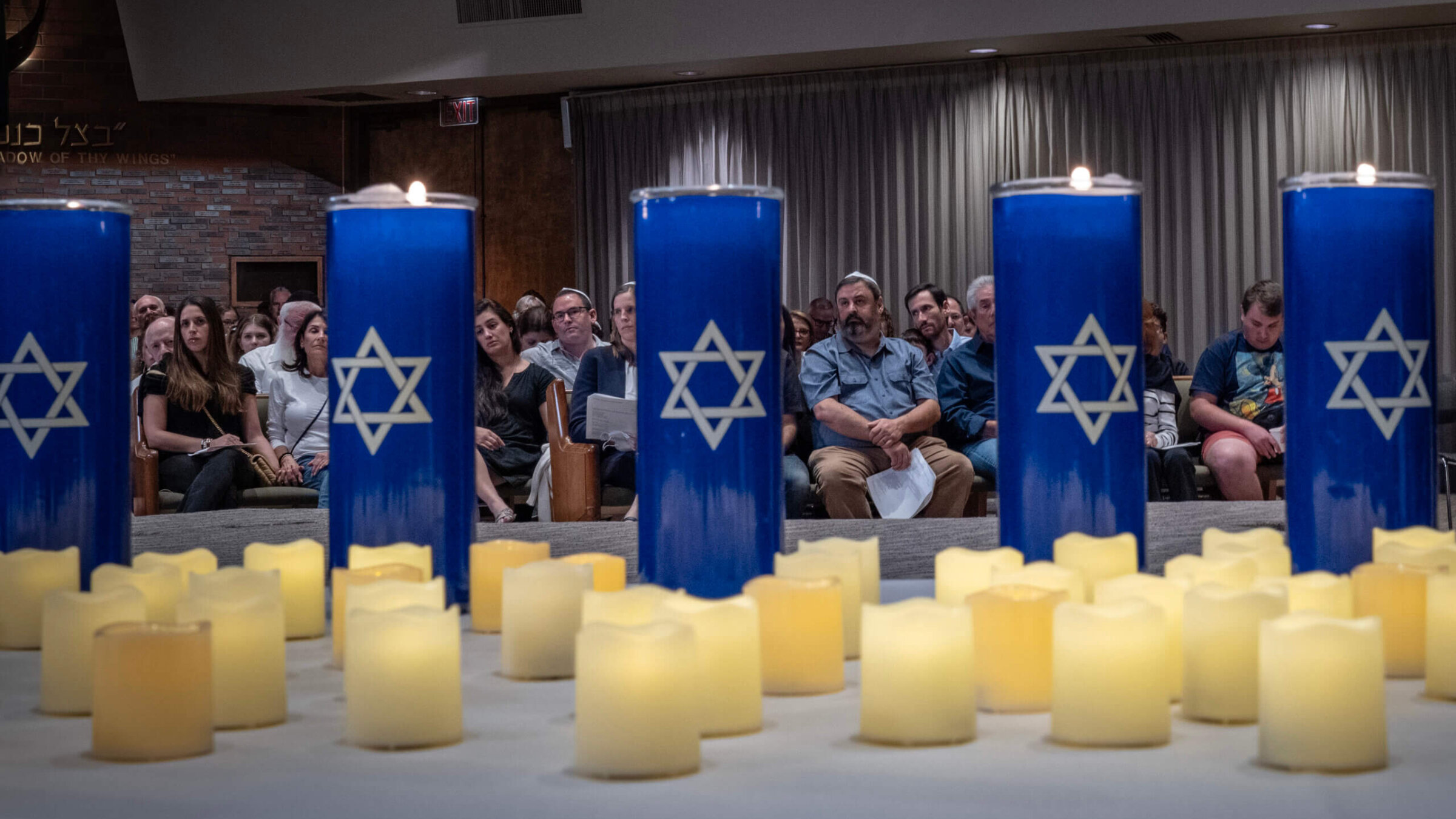Our Jewish community has become divided. Hamas’ attack reminds us that we must stand together
It’s up to Jews from all camps to self-reflect, and to focus more on what holds us together than our differences

People attend a Sunday evening vigil amid the Israel-Hamas conflict at the Stephen Wise Temple in Los Angeles, California. Photo by Barbara Davidson/Getty Images
No one knows, at this point, how Israel’s vaunted military intelligence apparatus failed so terribly — how it could have been unaware of a brewing full-scale invasion by Hamas, which led to the murder of hundreds, the maiming of thousands, the abduction of at least 150.
What is certain is that the apparatus failed. As an Orthodox Jew, I see this failure as a tragic affirmation of my belief that weapons, surveillance and covert operations — while all proper and necessary — are not what ultimately protects Jews. What protects us is the Creator, and our fealty to our tradition, our Torah, and our unity as a people.
The horrific attack is an attack on all Jews. The display of a swastika by a protester at a pro-Palestinian New York rally was deeply telling. And the evil aimed at us should serve all our Jewish tribes as a wake-up call about what we owe each other.
No one but a prophet — and there are none today — can say why things have happened. But soul-searching is always in Jewish season.
I will start with my own community, the Haredim. We believe b’emunah shlaymah — with complete belief — that the study of Torah, the observance of its laws, and Jewish prayer are what ultimately ensure Jews’ well being. Too often, though, we detach ourselves from Jews who do not share that belief — or at least not as completely — and isolate ourselves in entirely separate communities from our fellow Jews.
That is a natural outgrowth of the fact that lives revolving around observance and study necessarily create a bubble. But we need to foster a stronger sense of Klal Yisrael — a complete Jewish community. I write here not about kiruv, or outreach, aimed at increasing fellow Jews’ level of religious observance, but about concern for fellow Jews because they are, well, fellow Jews. Regardless of how they express that identity.
Religious Zionists, or modern Orthodox Israelis, would also benefit from introspection — at least those among them who have decided to flout both Israel’s rabbinic and governmental authorities to ascend the Temple Mount in increasing numbers. While this site where our ancient temples stood is the holiest in Judaism, it is now home to Al Aqsa Mosque and, under an agreement with the Jordanian Waqf, Jewish prayer is banned there.
Hamas clearly needs no excuse to try to kill Jews — it is practically its raison d’être — but it is significant that the terrorist group’s leaders have dubbed their murderous attack “Operation Al-Aqsa Flood.” We should not give them pretense.
The fact that the terrible events of this Shemini Atzeret in Israel came on the heels of months of mass protests is also worth scrutiny. The protesters chanted about democracy, but some insightful observers believe they were at least in part motivated by fears of an Israel where Haredim like me are a rapidly growing share of the population. Less than two weeks earlier, on Yom Kippur eve, the holiest time on the Jewish calendar, secular Jews disrupted an Orthodox prayer service in Tel Aviv’s Dizengoff Square because it was gender-segregated. The dispersing of fellow Jews praying was a shameful show of disrespect and disunity.
Shemini Atzeret, a holiday that coincides in Israel with Simchat Torah, is described in the Talmud with this moving parable:
A king invited his servants to a large feast that lasted a number of days. On the final day of the festivities, the king told the one most beloved to him: Your imminent separation from me pains me. Prepare a small repast for me so that I can enjoy your exclusive company.
The king in the parable is, of course, God. And one interpretation of His words in the parable is that they refer not to an impending separation between God and the Jews, but rather to the separations that all too often exist among the latter.
Such separations have been all too sadly evident in recent months and years. The current war, tragically, has united Israeli Jews in anguish and mourning.
The tzav hasha’ah, the order of the moment, I feel, is for all us Jews — in Israel and around the world — to seize that sense of unity and hold it tight. We must do our best to maintain and nurture it, despite our differences, even after the current crisis passes.
A message from our CEO & publisher Rachel Fishman Feddersen
I hope you appreciated this article. Before you go, I’d like to ask you to please support the Forward’s award-winning, nonprofit journalism during this critical time.
We’ve set a goal to raise $260,000 by December 31. That’s an ambitious goal, but one that will give us the resources we need to invest in the high quality news, opinion, analysis and cultural coverage that isn’t available anywhere else.
If you feel inspired to make an impact, now is the time to give something back. Join us as a member at your most generous level.
— Rachel Fishman Feddersen, Publisher and CEO